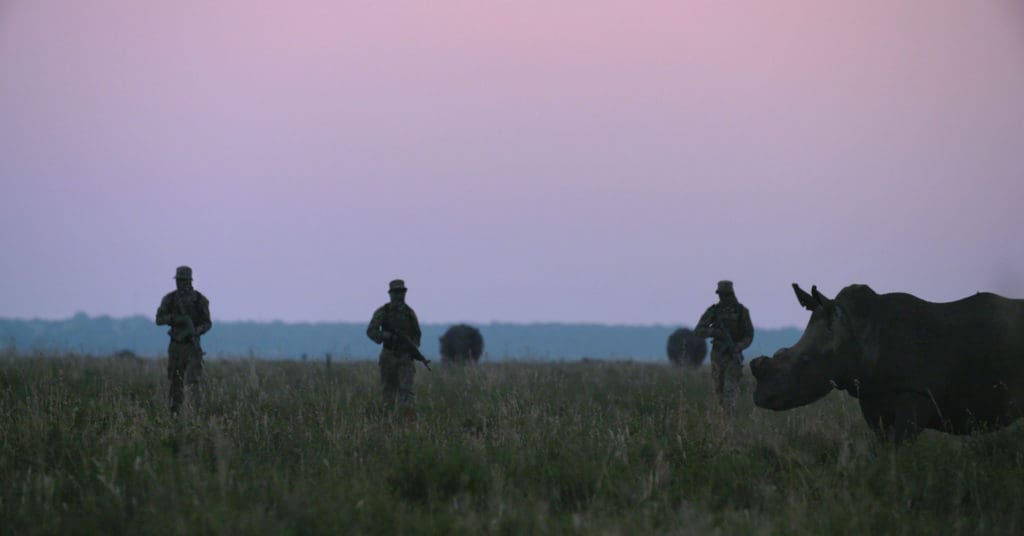
When it comes to killing animals for sport, the sides of the debate seem pretty clear-cut. Either you think it’s acceptable or you don’t. However, the new documentary, Trophy, co-directed by Shaul Schwarz and Christina Clusiau, suggests that not only is the issue of hunting vs. conservationism not so black-and-white, but that the two may be inextricably intertwined.
We begin by meeting Philip Glass (no, not that one), a Texan sheep farmer on the quest to hunt the “Big Five” game animals: buffalo, leopard, lion, rhino and elephant. However, he’s after smaller prey when we first see him, teaching his young son how to choose and shoot the right deer buck. Depending on your perspective, the scene seems either grotesque or beautiful—a brutal if swift killing or the passing down of a generations-old skill from father to son. Schwarz and Clusiau don’t ask the audience to make a judgement on Glass then. They simply allow us to view the moment through the filter of our own preconceptions.
We bring those same preconceptions to the following scene, in which John Hume–the largest private rhino breeder in South Africa–and a crew tranquilize a rhino, blindfold it and then saw off its horns. The practice seems brutal, possibly even cruel juxtaposed with Glass shooting a dear a few minutes earlier, but as the film goes on, Schwarz and Clusiau force us to challenge our opinions of both.
Believe it or not, Glass and Hume are both concerned with conservation. As Glass explains at one point, the Bible says God gave humans “dominion” over the animals. For him, the greatest way he can honor these animals is to share the excitement and rush of the kill with them. Frequently throughout the film, both he and those involved with the hunting industry insist on the idea of “if it pays, it stays.” Basically, that the money hunters spend on acquiring trophies both helps fund the animals’ conservation and supports the local communities in which they hunt. Indeed, when Glass kills a young, male elephant during the film, he points out that its meat will feed a local village.
There’s undeniable truth to that statement, but the locals themselves also undercut the nobility of Glass’s purpose when they point out that the elephant is so small, the meat will quickly run out. Suddenly, Glass’s justifications and his more sportsmanlike hunting methods seem hollow and all that’s left is a dead young elephant.
By contrast, Hume takes the opposite journey. When we meet him, he’s cutting off a rhino’s horn, breeding wild animals for profit as if they were cows. It’s easy to dismiss him as a capitalist monster concerned only with making money. However, we soon learn he actually isn’t making a profit—at least not yet. The South African government outlawed the sale of rhino horn in 2009 and all Hume has done since is stockpile a whopping 5 tons of it (which he estimates would sell for about $16 million).
On the surface, outlawing the sale of rhino horn would seem like the easiest way to stop poaching, but the film suggests the truth is more complex. In 2007, only 13 rhinos were poached in South Africa. In 2014, that number skyrocketed to 1,215. Knowing that, the people self-righteously condemning Hume (who went to court to rescind the law and won) suddenly seem a little naive.
Perhaps besides those who take part in “canned hunting” (facilities that remove so much of the sportsmanship of the experience that hunters can actually flip through photos to choose exactly which animal to eventually kill), those who think humans have no right to kill animals for sport at all come off the worst in the course of the film.
Though we see interviews with Will Travers and Adam Roberts of the Born Free Foundation, it’s the protestors outside of the annual Safari Club International Convention in Las Vegas who are the film’s most memorable hardline conservationists. Shown so late and contrasted with Glass’s polite disagreement, they seem arrogant and, if not stupid, then at least unaware of conservationism’s true complexities.
That’s only emphasized by the film’s portrayal of the public outrage over the 2015 killing of Cecil the Lion by Minnesota dentist, Walter Palmer. Yes, the media coverage may have changed American policies on lion hunting, but like the South African rhinos, there’s more incentive to keep the species alive and protected if they can be commodified.
As Dr. Craig Parker, an ecologist who ran the Serengeti Lion Project for 35 years explains, people’s desire to turn a profit off of lions and other animals has led to breeding programs that have essentially restored ecosystems. Hypocritical as it may seem, “if it pays, it stays,” actually has truth to it.
Trophy does not provide easy answers. Discourse–especially now–feels so black-and-white, but Schwarz and Clusiau force the audience to think holistically. They ask us to confront the complexity of what big game hunting means and suggest that the only way forward is to consider the possibility that the only way we won’t end up hunting species to extinction is to domesticate them. It’s an uncomfortable idea and coupled with some pretty graphic animal deaths, the film isn’t necessarily an enjoyable watch.
However, shying away from a challenging problem won’t fix it. Maybe having “dominion” over the earth and its creatures means we have to come to terms with who we are even if we may not like who we are.
Trophy Rating: 9/10
https://www.youtube.com/watch?v=65OCUtz-aIM

